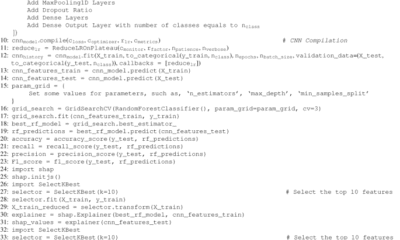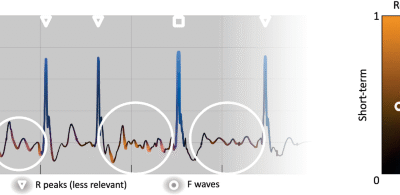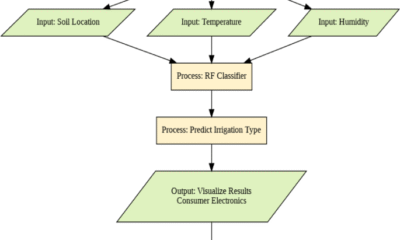AI Insights
OU Enters Next Phase of AI Innovation

NORMAN, OKLA. – With roughly one-quarter of the University of Oklahoma’s research rooted in AI, OU is harnessing its transformative power across fields to drive real-world solutions and equip students to thrive as professionals and citizens amid rapid technological change. To expand AI-driven innovation at the university and further a commitment to providing students with a leading AI education, OU has named Shishir Shah, Ph.D., as the first university-wide Chief Artificial Intelligence Officer, pending OU Regents’ approval.
“The University of Oklahoma is at the forefront of harnessing artificial intelligence to solve complex problems and drive meaningful change,” said OU President Joseph Harroz Jr. “Through pioneering research and cross-disciplinary collaboration, we are transforming AI’s potential into powerful solutions that address critical global challenges. Dr. Shah’s appointment signals a bold step forward in strengthening this commitment and accelerating our leadership in the field.”
Shah’s arrival comes at a defining moment for the university, as OU deepens its focus on AI as a key priority of the “Lead On, University: The Next Phase” Strategic Plan. By advancing university-wide strategy in AI innovation, research, education and implementation, Shah will lead a charge to reimagine curriculum and academic opportunities to integrate AI across the student educational experience, guaranteeing that OU graduates enter the workforce as literate and responsible AI-users able to leverage the technology for maximum impact.
OU’s Data Institute for Societal Challenges, which develops convergent research teams to make advances in data science, AI and machine learning, recently announced the award of nearly $200,000 in pilot seed funding to 20 AI-focused projects touching on topics from legal education to clinical imaging reports.
This new wave of activity builds on OU’s existing commitment to AI-enabled research. In health fields, university researchers are using AI to develop novel endoscopic optical imaging techniques, advance cardiac arrhythmia research and make genetic discoveries that could lead to future breakthroughs for personalized medicine. AI powers OU’s next-generation weather research, including pioneering all-digital polarimetric phased array radar. Student researchers are also deploying AI, including seniors in the School of Meteorology who dedicated their senior capstone work to researching explainable artificial intelligence and the formation of tornadoes, tackling the problem of severe weather that impacts Oklahomans every year.
Under Shah’s leadership, OU is poised to strengthen its role at the forefront of ethical and transformative uses of AI, expanding its global impact and capacity to address society’s most complex challenges.
Shah’s research expertise concentrates on computer vision and machine learning, and he is an expert in person re-identification, human motion and behavior analysis, and microscope image analysis. His recent work addresses real-world AI challenges, pushing the boundaries of adaptive, intelligent systems in complex environments.
Shah comes to OU from the University of Houston, where he served as Professor and Chair of the Department of Computer Science. He founded and led UH’s Quantitative Imaging Laboratory, which focuses on developing advanced image and video analysis tools that support complex decision making. He earned a B.S. in mechanical engineering, M.S. and Ph.D. in electrical and computer engineering from the University of Texas at Austin. Prior to joining the University of Houston in 2005, he served as a faculty member at Wayne State University before transitioning to leadership roles in two startup companies.
In addition to this appointment, Shah will join the Gallogly College of Engineering as Director of the School of Computer Science. He will report jointly to the Senior Vice President and Provost of both the OU Norman and OU Health Sciences campuses.
AI Insights
Artificial intelligence offering political practices advice about robocalls in Montana GOP internal spat

A version of this story first appeared in Capitolized, a weekly newsletter featuring expert reporting, analysis and insight from the editors and reporters of Montana Free Press. Want to see Capitolized in your inbox every Thursday? Sign up here.
The robocalls to John Sivlan’s phone this summer just wouldn’t let up. Recorded messages were coming in several times a day from multiple phone numbers, all trashing state Republican Rep. Llew Jones, a shrewd, 11-term lawmaker with an earned reputation for skirting party hardliners to pass the Legislature’s biggest financial bills, including the state budget.
Sivlan, 80, a lifelong Republican who lives in Jones’ northcentral Montana hometown of Conrad, wasn’t amused by the general election-style attacks hitting his phone nearly a year before the next legislative primary. Jones, in turn, wasn’t impressed with the Commissioner of Political Practices’ advice that nothing could be done about the calls. The COPP polices campaigns and lobbying in Montana, and the opinion the office issued in response to a request from Jones to review the robocalls was written not by an office employee but instead authored by ChatGPT.
“They were coming in hot and heavy in July,” Sivlan said on Aug. 26 while scrolling through his messages. “There must be dozens of these.”
“Did you know that Llew Jones sides with Democrats more than any other Republican in the Montana Legislature? If he wants to vote with Democrats, Jones should at least switch parties,” the robocalls said.
“And then they list his number and tell you to call him and tell him,” Sivlan continued.
In addition to the robocalls, a string of ads running on streaming services targeted Jones. On social media, placement ads depicted Jones as the portly, white-suited county commissioner Boss Hogg from “The Dukes of Hazzard” TV comedy of the early 1980s. None of the ads or calls disclosed who was paying for them.
Jones told Capitolized that voters were annoyed by the messaging, but said most people he’s talked to weren’t buying into it. He assumes the barrage was timed to reach voters before his own campaign outreach for the June 2026 primary.
The COPP’s new AI helper concluded that only ads appearing within 60 days of an election could be regulated by the office. The ads would also have to expressly advise the public on how to vote to fall under campaign finance reporting requirements.
In the response emailed to Jones, the AI program followed its opinion with a very chipper “Would you like guidance on how to monitor or respond to such ads effectively?”
“I felt that it was OK,” Commissioner Chris Gallus said of the AI opinion provided to Jones. “There were some things that I probably would have been more thorough about. Really at this point I wanted Llew to see where we were at that time with the (AI) build-out, more than explicit instructions.”
The plan is to prepare the COPP’s AI system for the coming 2026 primary elections, at which point members of the COPP staff will review the bot’s responses and supplement when necessary. But the system is already on the commissioner’s website, offering advice based solely on Montana laws and COPP’s own data, and not on what it might scrounge from the internet, according to Gallus.
Earlier this year, the Legislature put limits on AI use by government agencies, including a requirement for government disclosure and oversight of decisions and recommendations made by AI systems. The bill, by Rep. Braxton Mitchell, R-Columbia Falls, was opposed by only a handful of lawmakers.
Gallus said the artificial intelligence system at COPP is being built by 3M Data, a vendor with previous experience with machine learning for the Red Cross and the oil companies Shell and Exxon, where systems gathered and analyzed copious amounts of operational data. COPP has about $38,000 to work with, Gallus said.
The pre-primary battles within the Montana Republican Party are giving the COPP’s machine learning an early test, while also exposing loopholes in campaign reporting laws.
There is no disclosure law for the ads placed on streaming services, unlike ad details for traditional radio and TV stations, cable and satellite, which must be available for public inspection under Federal Communications Commission law. The state would have to fill that gap, which the FCC and Federal Election Commission have struggled to do since 2011.
Streaming now accounts for 45% of all TV viewing, according to Nielsen, more than broadcast and cable combined. Cable viewership has declined 39% since 2021.
“When we asked KSEN (a popular local radio station) who was paying for the ads, they didn’t know,” Jones said. “People were listening on Alexa.”
Nonetheless, Jones said the robocalls are coming from within the Republican house. An effort by hardliners to purge more centrists legislators from the party has been underway since April, when the MTGOP executive board began “rescinding recognition” of the state Republican senators who collaborated with a bipartisan group of Democrats and House Republicans to pass a budget, increase teacher pay and lower taxes on primary homes.
Being Republican doesn’t require recognition by the MTGOP “e-board,” as it’s known. In June, when the party chose new leadership, newly elected Chair Art Wittich said the party would no longer stay neutral in primary elections and would look for conservative candidates to support.
Republicans who have registered campaigns for the Legislature were issued questionnaires Aug. 17 by the Conservative Governance Committee, a group chaired by Keith Regier, a former state legislator and father of a Flathead County family that’s sent three members to the Montana Legislature; in 2023 Keith Regier and two of his children served in the Legislature simultaneously.
Membership for the Conservative Governance Committee and a new Red Policy Committee to prioritize legislative priorities is still a work in progress, new party spokesman Ethan Holmes said this week.
The 14 questions, which Regier informed candidates could be used to determine party support of campaigns, hit on standard Republican fare: guns, “thoughts on transgenderism,” and at what point human life starts. There was no question about a willingness to follow caucus leadership. Regier’s son, Matt, was elected Senate president late 2024, but lost control of his caucus on the first day of the legislative session in January.
AI Insights
“AI Is Not Intelligent at All” – Expert Warns of Worldwide Threat to Human Dignity

Opaque AI systems risk undermining human rights and dignity. Global cooperation is needed to ensure protection.
The rise of artificial intelligence (AI) has changed how people interact, but it also poses a global risk to human dignity, according to new research from Charles Darwin University (CDU).
Lead author Dr. Maria Randazzo, from CDU’s School of Law, explained that AI is rapidly reshaping Western legal and ethical systems, yet this transformation is eroding democratic principles and reinforcing existing social inequalities.
She noted that current regulatory frameworks often overlook basic human rights and freedoms, including privacy, protection from discrimination, individual autonomy, and intellectual property. This shortfall is largely due to the opaque nature of many algorithmic models, which makes their operations difficult to trace.
The black box problem
Dr. Randazzo described this lack of transparency as the “black box problem,” noting that the decisions produced by deep-learning and machine-learning systems cannot be traced by humans. This opacity makes it challenging for individuals to understand whether and how an AI model has infringed on their rights or dignity, and it prevents them from effectively pursuing justice when such violations occur.

“This is a very significant issue that is only going to get worse without adequate regulation,” Dr. Randazzo said.
“AI is not intelligent in any human sense at all. It is a triumph in engineering, not in cognitive behaviour.
“It has no clue what it’s doing or why – there’s no thought process as a human would understand it, just pattern recognition stripped of embodiment, memory, empathy, or wisdom.”
Global approaches to AI governance
Currently, the world’s three dominant digital powers – the United States, China, and the European Union – are taking markedly different approaches to AI, leaning on market-centric, state-centric, and human-centric models, respectively.
Dr. Randazzo said the EU’s human-centric approach is the preferred path to protect human dignity, but without a global commitment to this goal, even that approach falls short.
“Globally, if we don’t anchor AI development to what makes us human – our capacity to choose, to feel, to reason with care, to empathy and compassion – we risk creating systems that devalue and flatten humanity into data points, rather than improve the human condition,” she said.
“Humankind must not be treated as a means to an end.”
Reference: “Human dignity in the age of Artificial Intelligence: an overview of legal issues and regulatory regimes” by Maria Salvatrice Randazzo and Guzyal Hill, 23 April 2025, Australian Journal of Human Rights.
DOI: 10.1080/1323238X.2025.2483822
The paper is the first in a trilogy Dr. Randazzo will produce on the topic.
Never miss a breakthrough: Join the SciTechDaily newsletter.
AI Insights
Mexico says works created by AI cannot be granted copyright
In an era where artwork is increasingly influenced and even created by Artificial Intelligence (AI), Mexico’s Supreme Court (SCJN) has ruled that works generated exclusively by AI cannot be registered under the copyright regime. According to the ruling, authorship belongs solely to humans.
“This resolution establishes a legal precedent regarding AI and intellectual property in Mexico,” the Copyright National Institute (INDAUTOR) said on Aug. 28 in a statement on its official X account following the SCJN’s decision.
The SCJN’s unanimous decision said that the Federal Copyright Law (LFDA) reserves authorship to humans, and that any creative invention generated exclusively by algorithms lacks a human author to whom moral rights can be attributed.
According to the Supreme Court, automated systems do not possess the necessary qualities of creativity, originality and individuality that are considered human attributes for authorship.
“The SCJN resolved that copyright is a human right exclusive to humans derived from their creativity, intellect, feelings and experiences,” it said.
The Supreme Court resolved that works generated autonomously by artificial intelligence do not meet the originality requirements of the LFDA. It said that those requirements are constitutional as limiting authorship to humans is “objective, reasonable and compatible with international treaties.”
It further added that protections to AI can’t be granted on the same basis as humans, since both have intrinsically different characteristics.
What was the case about?
In August 2024, INDAUTOR denied the registration application for “Virtual Avatar: Gerald García Báez,” created with an AI dubbed Leonardo, on the basis that it lacked human intervention.
“The registration was denied on the grounds that the Federal Copyright Law (LFDA) requires that works be of human creation, with the characteristic of originality as an expression of the author’s individuality and personality,” INDAUTOR said.
The applicant contested the denial, arguing that creativity should not be restricted to humans. In the opinion of the defendant, excluding works generated by AI violated the principles of equality, human rights and international treaties, including the United States, Mexico and Canada agreement (USMCA) and the Berne Convention.
However, the Supreme Court clarified that such international treaties do not oblige Mexico to give copyrights to non-human entities or to extend the concept of authorship beyond what is established in the LFDA.
Does the resolution allow registration of works generated with AI?
Yes, provided there is a substantive and demonstrable human contribution. This means that works created in collaboration with AI, in which humans direct, select, edit or transform the result generated by AI until it is endowed with originality and a personal touch, are subject to registration before INDAUTOR.
Intellectual property specialists consulted by the newspaper El Economista explained that to register creative work developed in collaboration with AI, it is important to document the human intervention and submit the creative process in a way that aligns with the LFDA.
Mexico News Daily
-

 Business3 days ago
Business3 days agoThe Guardian view on Trump and the Fed: independence is no substitute for accountability | Editorial
-
Tools & Platforms3 weeks ago
Building Trust in Military AI Starts with Opening the Black Box – War on the Rocks
-

 Ethics & Policy1 month ago
Ethics & Policy1 month agoSDAIA Supports Saudi Arabia’s Leadership in Shaping Global AI Ethics, Policy, and Research – وكالة الأنباء السعودية
-

 Events & Conferences3 months ago
Events & Conferences3 months agoJourney to 1000 models: Scaling Instagram’s recommendation system
-

 Jobs & Careers2 months ago
Jobs & Careers2 months agoMumbai-based Perplexity Alternative Has 60k+ Users Without Funding
-

 Funding & Business2 months ago
Funding & Business2 months agoKayak and Expedia race to build AI travel agents that turn social posts into itineraries
-

 Education2 months ago
Education2 months agoVEX Robotics launches AI-powered classroom robotics system
-

 Podcasts & Talks2 months ago
Podcasts & Talks2 months agoHappy 4th of July! 🎆 Made with Veo 3 in Gemini
-

 Podcasts & Talks2 months ago
Podcasts & Talks2 months agoOpenAI 🤝 @teamganassi
-

 Mergers & Acquisitions2 months ago
Mergers & Acquisitions2 months agoDonald Trump suggests US government review subsidies to Elon Musk’s companies





















